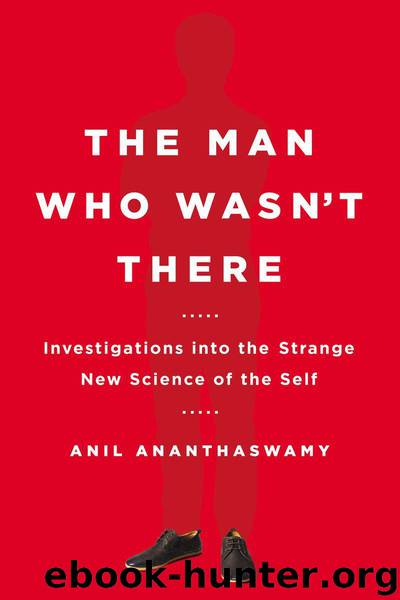The Man Who Wasn't There: Investigations into the Strange New Science of the Self by Ananthaswamy Anil

Author:Ananthaswamy, Anil [Ananthaswamy, Anil]
Language: eng
Format: epub
Publisher: Penguin Publishing Group
Published: 2015-08-04T04:00:00+00:00
Nicholas knows only too well the importance of feeling connected to one’s body. “I have never been so aware of what your core is as a person until I got depersonalized and felt disconnected with my physical body,” he said. “Honestly—and I’m not just saying this because I have it—I think one of the scariest things a human being can endure is the feeling of separation between your physical body and your mind, but being completely cognizant of it the whole time. It’s like being eaten alive.”
He has discussed his ongoing depersonalization with his physician. After Nicholas signed a release form, I spoke with her over the phone, and she confirmed that she had been treating Nicholas for anxiety, which had improved, but he had not shown much improvement in his depersonalization. She had referred him to a neurologist to rule out temporal-lobe epilepsy (which can sometimes cause depersonalization)—but the waiting times for specialist care in Nova Scotia being what they are, Nicholas was still dealing with his illness on his own.
I asked Nicholas about the guitar I saw in his living room. He’s learning the instrument. He’d prefer to play drums, he told me, but he is not allowed to play them in the apartment they live in. He’s waiting to move into a house where he can begin drumming again. It brings him relief from depersonalization. “Drumming requires all your attention,” said Nicholas. “When you are using all four limbs, it takes so much attention that it allows you to experience some relief.”
I was reminded of a patient Nick Medford had mentioned. The patient had been a good amateur tennis player in London but had stopped playing tennis because of depersonalization. “The only meaningful thing that I managed to do for him was to persuade him to start playing tennis again,” Medford told me. “When he was running around the tennis court, completely immersed in the flow of that, [the depersonalization] would lift. It would come back again, unfortunately, but it was nevertheless quite significant for him, because it proved to him that it wasn’t fixed; it was malleable.”
Nicholas also pointed out that while drumming alleviated his symptoms, the relief was nevertheless transient. The moment he became aware that he was feeling better, the depersonalization returned. “It’s a paradox; you think about the fact that you are feeling better, and you start feeling depersonalized again,” he said.
Could the complex phenomenology of depersonalization be the outcome of a predictive brain gone wrong?
Download
This site does not store any files on its server. We only index and link to content provided by other sites. Please contact the content providers to delete copyright contents if any and email us, we'll remove relevant links or contents immediately.
Periodization Training for Sports by Tudor Bompa(8273)
Why We Sleep: Unlocking the Power of Sleep and Dreams by Matthew Walker(6725)
Paper Towns by Green John(5191)
The Immortal Life of Henrietta Lacks by Rebecca Skloot(4588)
The Sports Rules Book by Human Kinetics(4387)
Dynamic Alignment Through Imagery by Eric Franklin(4217)
ACSM's Complete Guide to Fitness & Health by ACSM(4060)
Kaplan MCAT Organic Chemistry Review: Created for MCAT 2015 (Kaplan Test Prep) by Kaplan(4012)
Livewired by David Eagleman(3775)
Introduction to Kinesiology by Shirl J. Hoffman(3772)
The Death of the Heart by Elizabeth Bowen(3622)
The River of Consciousness by Oliver Sacks(3604)
Alchemy and Alchemists by C. J. S. Thompson(3522)
Bad Pharma by Ben Goldacre(3428)
Descartes' Error by Antonio Damasio(3279)
The Emperor of All Maladies: A Biography of Cancer by Siddhartha Mukherjee(3163)
The Gene: An Intimate History by Siddhartha Mukherjee(3098)
The Fate of Rome: Climate, Disease, and the End of an Empire (The Princeton History of the Ancient World) by Kyle Harper(3067)
Kaplan MCAT Behavioral Sciences Review: Created for MCAT 2015 (Kaplan Test Prep) by Kaplan(2986)
